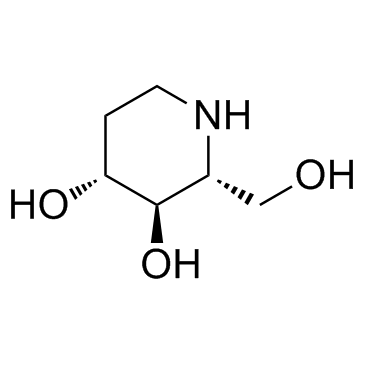| Description |
Fagomine is a mild glycosidase inhibitor. The Ki of the iminosugar Fagomine is 4.8 μM, 39 μM, and 70 μM for Amyloglucosidase (A.niger), β-Glucosidase (bovine), and Isomaltase (yeast), respectively.
|
| Related Catalog |
|
| Target |
Glycosidase[1]
|
| In Vitro |
Fagomine (D-fagomine) is an iminosugar that has been shown to selectively agglutinate Enterobacteriales in vitro. Fagomine selectively agglutinates fimbriated enterobacteria (e.g., E.coli) and inhibits their adhesion to the intestinal mucosa; the reason for this is probably related to its structural similarity with lectin-binding saccharides (e.g., mannose). Fagomine is capable of altering this effect of high-fat high-sucrose diet (HFHS) on the proportion of Enterobacteriales and E.coli[2].
|
| In Vivo |
Fagomine (D-fagomine) is a natural iminosugar that counteracts the short-term effects of a high-energy-dense diet on body weight, fasting blood glucose levels and the proportion of gut Enterobacteriales[3]. Compare to the standard group, rats fed high-fat high-sucrose diet (HFHS) with Fagomine (D-fagomine) gain significantly less weight (15.3%) than those fed HFHS (20.9%)[2].
|
| Kinase Assay |
Lysosomal enzyme activities in cell lysates are determined. Briefly, cells are scraped in ice-cold 0.1% Triton X-100 in water. After centrifugation (6000 rpm for 15 min at 4°C) to remove insoluble materials, protein concentrations are determined using Protein Assay Rapid Kit. The lysates are incubated at 37°C with the corresponding 4-methylumbelliferyl β-D-glycopyranoside solution in 0.1 M citrate buffer (pH 4). The liberated 4-methylumbelliferone is measured with a fluorescence plate reader (excitation 340 nm; emission 460 nm). For enzyme inhibition assay, cell lysates from normal skin fibroblasts are mixed with the 4-methylumbelliferyl β-D-glycopyranoside substrates in the absence or presence of increasing concentrations of Fagomine[1].
|
| Cell Assay |
Human skin fibroblasts from a healthy and three Gaucher disease patients (with N188S/G183W, V230G/R296X and L444P/L444P mutations) are maintained in our laboratory with DMEM supplemented with 10% FBS as the culture medium. For enzyme activity enhancement assay, cells are cultured in the presence of different concentrations of Fagomine or DMSO alone (as a control) for 5 days and harvested by scraping. Cytotoxicity of Fagomine is monitored by measuring the lactate dehydrogenase activities in the cultured supernatants[1].
|
| Animal Admin |
Rats[3] Sprague-Dawley rats (male, 22 weeks old) are randomly assigned to one of the three dietary groups: the control group, fed a standard diet (STD); a group fed HFHS (modified high-fat high-sucrose diet); and a group fed HFHS supplemented with 0.065% Fagomine (HFHS+FG). The percentage of Fagomine is adjusted so that its ratio to sucrose is 2 mg/g, as defined before from the results of post-prandial tests.The modified diets are processed. Feed consumption is monitored every day throughout the experiment and body weight is measured before and at the end of the nutritional intervention. All animal manipulations are carried out in the morning to minimize the effects of circadian rhythms.
|
| References |
[1]. Mena-Barragán T, et al. Inhibitor versus chaperone behaviour of d-fagomine, DAB and LAB sp2-iminosugar conjugates againstglycosidases: A structure-activity relationship study in Gaucher fibroblasts. Eur J Med Chem. 2015 Aug 31. pii: S0223-5234(15)30222-1. [2]. Ramos-Romero S, et al. Effect of (D)-fagomine on excreted Enterobacteria and weight gain in rats fed a high-fat high-sucrose diet. Obesity (Silver Spring). 2014 Apr;22(4):976-9. [3]. Molinar-Toribio E, et al. D-Fagomine attenuates metabolic alterations induced by a high-energy-dense diet in rats. Food Funct. 2015 Aug;6(8):2614-9.
|

![(3S,4R)-6-[(benzyloxycarbonyl)amino]-5,6-dideoxy-2-hexulose structure](https://image.chemsrc.com/caspic/439/121742-14-1.png)

![(1R,2R,6S)-2-(tert-butyldiphenylsilanyloxymethyl)-7-oxa-3-azabicyclo[4.1.0]heptane-3-carboxylic acid tert-butyl ester structure](https://image.chemsrc.com/caspic/356/354153-40-5.png)

![(4aR,8R,8aR)-tert-butyl hexahydro-8-hydroxy-2,2-dimethyl[1,3]dioxino[5,4-b]pyridine-5-carboxylate structure](https://image.chemsrc.com/caspic/431/768387-41-3.png)
![(S)-but-3-enyl[1-(tert-butyldiphenylsilanyloxymethyl)allyl]carbamic acid tert-butyl ester structure](https://image.chemsrc.com/caspic/249/354153-38-1.png)